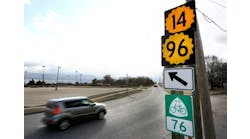Keeping traffic flowing means everything to business owners along a busy commercial street. If the street has to be closed long for repaving, it can cost a business big money in lost revenue.
But as a recent project in Iowa shows, traffic disruption and street closure times can be minimized by the speed of construction made possible by paving with hot-mix asphalt. In one of the most dramatic demonstrations ever of speed in street reconstruction, officials in Des Moines recently milled and resurfaced two miles of four- and five-lane street—start to finish—in less than two weeks. For purposes of construction phasing, the two-mile stretch of road was broken into two sections, one 4,800 ft long and the other 6,000 ft long. The bottom line: each section was closed to traffic for just a few business hours—and only during actual paving.
Pulling it off required careful planning, aggressive scheduling and sky-high numbers of personnel, equipment and materials—as well as skilled management to coordinate it all.
The site was a stretch of Army Post Road from East 14th Street to Fleur Drive. The street ranges from 48 to 65 ft wide, with four to five traffic lanes and parking on both sides. Additionally, the street carries 24,000 vehicles per day with a high percentage of trucks and is densely developed with businesses, including a major shopping mall. To minimize traffic disruption, city officials initiated a "fast-track" process that included cold milling and cleanup, base and curb repairs, paving with two specially developed mixes and same-day striping. The project cost was $440,000.
Army exercise
The city of Des Moines’ Department of Public Works and a private contractor, Des Moines Asphalt and Paving Co., teamed up and divided the work. Consultant John Bellizzi had devised a plan for the businesses along Army Post Road to remain open nearly all the time during construction.
One week was allowed to profile and pave each section and one day of each week was spent paving. During the week of June 4, Des Moines Asphalt profiled the 4,800-ft-long first section 2 in. deep over two days with no road closure. The contractor recycled all of the asphalt paving material that was removed. With profiling complete, the city followed up with a day’s worth of base and curb repairs, intake and manhole adjustments and milling cleanup. The city also performed all traffic control.
The displays of equipment and coordination on the two paving days were truly awesome. For both sections, Des Moines Asphalt operated two batch plants to produce mix. On the first section, the total rate of production was about 500 to 525 tons per hour; on the second section the rate increased to 600 tons per hour.
In paving the first section, the contractor deployed four pavers, including one for turning lanes, to pave the street full-width. Starting at 5:30 a.m., 35 haul trucks began delivering mix to the four pavers. The four mainline pavers consisted of one 25-ft-wide paver and two other pavers working 12 to 121/2 ft wide. The turning lane paver also worked at about 12 ft wide.
A polymer-modified mix was used to provide extra resistance against rutting on the turning lanes and stopping areas of the first section. One plant supplied the polymer mix; the other made the mainline mix, which contained a PG 64-22 binder. The polymer mixture was made with PG 70-22 asphalt cement and 75% crushed, hard limestone of 1/2-in. top-size. The remainder of the aggregate was 25% washed sand.
Coordinating production from the two plants was the contractor’s major challenge on the project. To make it easier to differentiate the two HMA mixtures in the field, the contractor hauled the mainline mix in 17 live-bottom trucks; straight tandem-axle dump trucks hauled the polymer mixture.
"We had predetermined the places where we had to convert from one mix to another," said Bellizzi. "We watched the station markers and we knew the paving rates, so it ran real easy. We hit our marks almost exactly."
Bob Goodhue, vice president of operations for Des Moines Asphalt, concurred. "Most of the mix was measured up beforehand. Greg Kinser, who managed the project for us, would calculate how many tons it would take to get through the intersection, and then he would order that much. All our trucks have radios in them, and it was a case of keeping measured up ahead (by the station markers) with what you needed. The plants stayed in touch with the laydown crews and sent out from each plant the amount of mix needed. It worked out very well.
"Our theory was, as long as we weren’t short a load (to finish an intersection, for example) we were in great shape, and if we went over a load or two it didn’t hurt anything," said Goodhue.
One of Des Moines’ largest shopping centers is located on the first section of the Army Post Road repaving job. The shopping center opens at 10 a.m., and on the first paving day the paving train was well past the shopping center entrance by that time.
The second section was profiled and paved much like the first section. It was, however, 6,000 ft long and contained far fewer intersections than the first. Because there were fewer intersections, and with experience gained from the first section, the contractor could increase production by 100 tons per hour, Bellizzi said. Only a small amount of polymer mix was needed for the second section.


